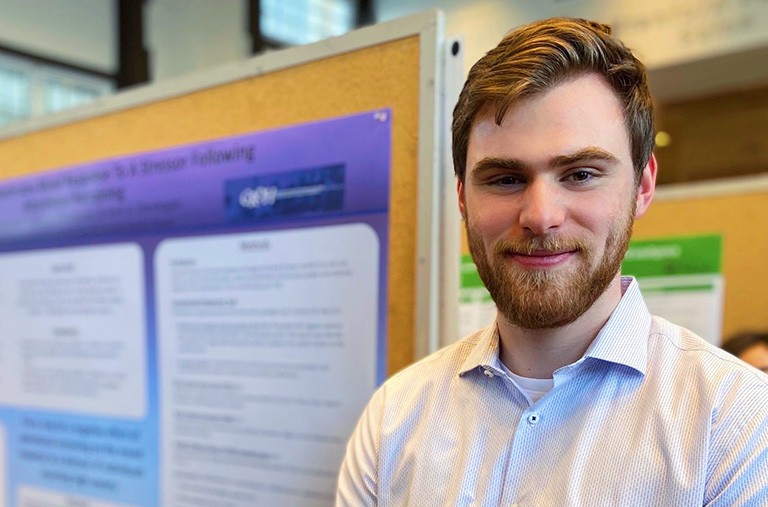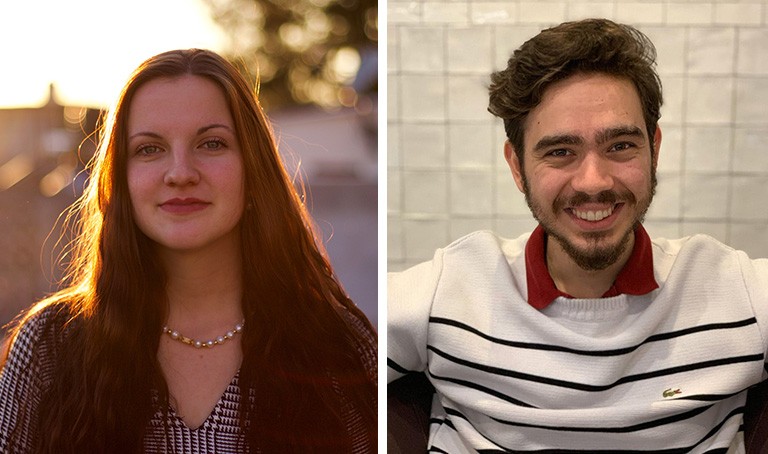Concordia’s Journal of Accessible Psychology recognizes undergrads’ finest work over the year
 First-place winner Ryan Aberback.
First-place winner Ryan Aberback.
Concordia’s Journal of Accessible Psychology (CJAP) has announced the winners of its inaugural Best Article Awards.
Top honour went to Ryan Aberback’s piece “Let’s Not Trip Out Just Yet!,” on the therapeutic uses of psychedelic substances such as LSD and psilocybin.
Laurie Houle placed in second with “Let’s Talk About This... Once More!,” which is about how co-rumination among friends is linked to depressive symptoms.
Third spot went to Steven Dobric’s “The Death of your Best Friends,” which looks at the genes linked to a healthy circadian system.
The three winners were awarded $100, $75 and $50, respectively.
Of the 10 articles selected for publication, the editors and reviewers conducted an anonymous vote for the best three.
“We considered everything from the quality of the writing, to the intrigue of the topic. But ultimately we were looking for something special about the article that really grabbed the reader,” says Milan Valyear, a CJAP co-founder and editor.
“As a neuroscience researcher, I was happy to see that one of the top three articles was about understanding the neurobiological changes that happen in the brain during Parkinson’s disease.”
 Laurie Houle and Steven Dobric.
Laurie Houle and Steven Dobric.
Trippy, ruminative and circadian
Aberback’s piece takes a look at the growing field of psychedelic science.
“My article is about the therapeutic potential of hallucinogenic substances like psilocybin and LSD. I first became interested in the topic two years ago, after I did an independent study course on the use of psychedelic drugs to treat various psychological disorders such as depression and anxiety,” he explains.
“I decided to write this following a spike in the number of stories seen on various media platforms claiming that psychedelics have endless benefits for mental health.”
Houle’s submission looks at the phenomenon of friendship co-rumination and its side effects.
“My article was about friends’ tendencies to co-ruminate, which means discussing negatively about the same problems, over and over again. Our study specifically assessed whether the link between co-rumination and depressive symptoms depends on friendship quality and on how friends individually manage their emotions when they are on their own,” notes Houle.
“My main objective was to inform people that all types of social support are not created equal, and that they should pay attention to both their friendship quality and to how their confidant regulates their negative emotions.”
Dobric’s article examines the changes in circadian rhythms seen in Parkinson’s disease.
“It highlights the importance of certain genes responsible for maintaining a healthy circadian system and their role in the neuronal changes seen in Parkinson’s patients,” he explains. “With this research, I aim to further our understanding of sleeping disorders exhibited by Parkinson’s patients that are often overlooked.”
A successful first year
The online journal was founded last fall by PhD candidates and former Concordia Public Scholars Valyear and Heather Herriot, along with editor-in-chief Alexa Ruel. Its mission is to teach undergraduate students about science communication by giving them the opportunity to write about their own psychological research.
“CJAP’s first year was active, informative and thrilling,” says Marie-Pier Paré-Ruel, also a CJAP editor
“Our main objective was to let psychology undergraduates know about this new initiative and get them excited about communicating science. We were extremely happy with the quality of submissions. Selecting the winning articles was not an easy task.”
The team is looking forward to reaching a wider audience this coming year, she says.
“In addition to preparing for a second round of submissions, we plan on hosting online workshops and writing sessions to teach the undergraduate population about science communication and help them feel ready to submit in May.”
Find out more about Concordia’s Journal of Accessible Psychology.



